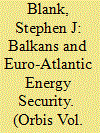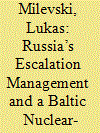| Srl | Item |
| 1 |
ID:
188111


|
|
|
|
|
| Summary/Abstract |
Within a resilient transatlantic alliance, political leadership and security forces can respond successfully to any crisis imposed, but without resilience the alliance will remain vulnerable to malign influences that seek to divide, sap physical and societal strength, and undermine the ability to respond to challenges—politically, economically, and militarily. Unity in a resilient security environment, with economic and political unity, is critical for defending against authoritarian regimes that aim to “divide and conquer.”
|
|
|
|
|
|
|
|
|
|
|
|
|
|
|
|
| 2 |
ID:
188114


|
|
|
|
|
| Summary/Abstract |
Europe’s current energy crisis underscores its failure to deal adequately with the problems posed by increasing dependence one Russian gas. Particularly in the Balkans Russia’s oligopolistic position if not monopoly in some countries adds to its leverage upon them, stimulates corruption and state capture, and in general inhibits the European integration project. Nevertheless, there are opportunities to bring more gas into the Balkans and through them to Central Europe to reduce Russia’s hegemonic position in the gas market and reverse the trend towards illiberalism and poor governance that marks the region. Albania’s example and the connections to its neighbors that flow form its EU-approved plan illustrate what should be done and how such programs would improve energy and governance, if not security, in the Balkans and Europe as a whole.
|
|
|
|
|
|
|
|
|
|
|
|
|
|
|
|
| 3 |
ID:
188117


|
|
|
|
|
| Summary/Abstract |
This article illustrates the role that General Studies courses in the Humanities can play in educating students about the complex dynamics by which cultural production may reflect, support, or change social structures, issues, and norms, through the specific examples of two English courses offered for General Studies credit at MSU Denver: “Monsters and Monstrosity” and “Vampire Films.” Grounded in a cultural-criticism approach to textual analysis, the courses read monsters as symbolic keys to the cultures that produce them. The terrifying and repulsive qualities of monsters invariably operate on the boundary between self and other. As an abject Other, the monster serves to reinforce our sense of what is different/non-normative/threatening, and the stamp of monstrosity legitimizes cultural bias, often perpetuating social marginalization and inequality.
|
|
|
|
|
|
|
|
|
|
|
|
|
|
|
|
| 4 |
ID:
188110


|
|
|
|
|
| Summary/Abstract |
The administration of George H. W. Bush was faced with an immediate challenge in 1989 with the success of the Polish Roundtable Accords between the independent trade union, Solidarity, and Poland’s communist government. The Bush administration wanted to support what could become fundamental change in Central and eastern Europe without strengthening the communist governments. They also felt they had to deal with budget constraints in the United States. They developed a five-step approach that mobilized Western support for democracy in Poland, set the model for other countries emerging from communism, but did not give carte blanche to non-democratic regimes. It is useful to remember these five steps in light of more recent U.S. approaches.
|
|
|
|
|
|
|
|
|
|
|
|
|
|
|
|
| 5 |
ID:
188109


|
|
|
| 6 |
ID:
188115


|
|
|
|
|
| Summary/Abstract |
Germany’s recent Ostpolitik (Eastern Policy) has become a major topic in Western discussions about how to deal best with Vladimir Putin’s Russia. This essay proceeds from Interdependence Theory to argue that the Berlin-promoted Nord Stream gas pipeline projects are loosening Russian-Ukrainian economic ties, and thereby easing conflict between the two post-Soviet states. Ukraine’s surprisingly peaceful development during its first 20 years as an independent state is contrasted with the escalation of tensions between Moscow and Kyiv in 2013–2014. The completion of the first Nord Stream pipe in October 2012 is seen as a crucial development that untied the Kremlin’s hand vis-à-vis Ukraine. The lowering of Moscow’s dependence on the Ukrainian gas transportation system, due to the new Baltic Sea pipeline, eventually led to a territorial conflict between Ukraine and Russia.
|
|
|
|
|
|
|
|
|
|
|
|
|
|
|
|
| 7 |
ID:
188112


|
|
|
|
|
| Summary/Abstract |
The North Atlantic Treaty Organization (NATO) must pivot to address a new era of persistent threats and disruptive challenges unbounded by geography. Reaffirming NATO’s cohesion as an alliance of democracies will be paramount. Each of NATO’s core tasks—defense and deterrence, crisis management, and cooperative security—must evolve to meet new dangers. The Alliance should add a fourth core task of comprehensive resilience: the ability to anticipate, prevent, and, if necessary, protect against and move forward from disruptions to critical functions of allied societies. A more capable Europe is essential to each of these tasks.
|
|
|
|
|
|
|
|
|
|
|
|
|
|
|
|
| 8 |
ID:
188116


|
|
|
|
|
| Summary/Abstract |
This article examines the idea of a Baltic Nuclear-Weapon Free Zone (NWFZ) in the context of the Russian Federation’s deterrence and escalation management theories, largely as enunciated by Russian military theorists. It first introduces the history of the Baltic NWFZ idea from the early 1960s to the present proposals, and then explores Russian escalation management. The author concludes by considering how Baltic NWFZ proposals may interact with—and be understood through—the Russian military’s perspective.
|
|
|
|
|
|
|
|
|
|
|
|
|
|
|
|
| 9 |
ID:
188113


|
|
|
|
|
| Summary/Abstract |
This article examines how seven potential drivers of the Russian Federation’s military interventions played out in seven instances in which Vladimir Putin was likely to have deliberated on whether or not to use military force in foreign countries, including three instances in which the Russian leader ultimately decided to intervene and four instances in which he did not. The article contends that carefully reviewing these historical episodes could help predict Putin’s military actions in the future.
|
|
|
|
|
|
|
|
|
|
|
|
|
|
|
|